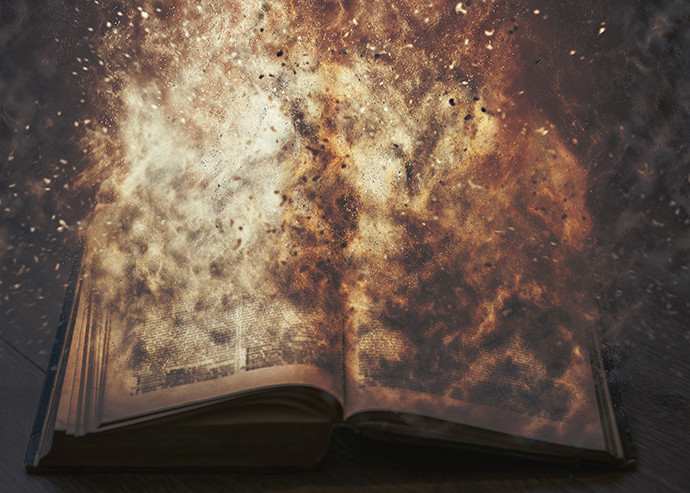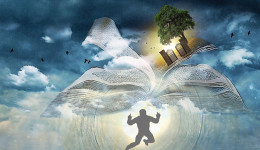How Book Culture Failed Me
Since the crossover appeal of the Harry Potter series took the publishing world by storm, the children’s lit market has exploded with books written thematically for children that are advanced enough for adults. It’s a wonderful time to be a young reader, with so many book options and discovery methods available to them. As a writer of children’s fiction, I’m reading more in that category now than I ever did as a young teen.
I had thought that was because there were so few conceptually advanced books around for middle-grade readers in the mid-‘90s, but I’m now discovering something far more insidious: the book culture in my town failed me as a young reader.
Long before I could drive, hold a job, and do all my shopping online, I was largely at the mercy of my school and public libraries and Scholastic book fairs (which carried works by other publishers as well) to find new books to read. I wanted something intellectually engaging, conceptually stimulating, and emotionally resonant. I wanted something fantastical, which challenged my notions of everyday life. I wanted something world-changing.
Pretty tall order, especially while everyone else was reading silly little horror stories known as Goosebumps.
I found a few, such as the Time series by Madeleine L’Engle, The Giver by Lois Lowry, and — a particular diamond in the rough — The Starlight Crystal by Christopher Pike. These books embedded their messages into my core and stayed with me through my formative years (which should be apparent to regular readers of this blog, as I mention them all the time).
By and large, though, the children’s book section just didn’t offer what I was looking for. I quickly outgrew the books available to my age group, in both concept and delivery. I even once had to fight with the school librarian to read a book “beyond” my grade. Soon, I gave up altogether and began reading adult books.
It’s a crying shame, because now upper middle grade/young adult books are my favorite category. As I read more of them for both pleasure and learning my craft, I’ve discovered authors who were writing incredible, thought-provoking tales back when I was a child.
Specifically?
HOW did I not know of this woman?
All my thanks to good friend Audra Atoche for shoving The Game into my hands and demanding I read it several months ago. I followed that up with her book of essays Reflections: On the Magic of Writing (a must-read for any children’s author) and, most recently, Dogsbody, both of which have solidified her in my mind as a kindred spirit along the same lines as Madeleine L’Engle.
Dogsbody I finished just this week, and I can’t recommend it enough. I want a time travel machine just so I can deliver it to thirteen-year-old me so I would have another friend who got how I saw the world as I grew up. How I still see the world, in fact.
In it, the Dog Star, Sirius, is found guilty of murder by a court of his heavenly peers, known as luminaries, who inhabit the celestial bodies in the universe. He is sentenced to be reborn on Earth as a dog and will only be reinstated to his former glory by discovering a powerful object that was lost on Earth.
It feels like this book was written just for me. So much of the series I am currently writing reflects the themes present in this novel: fascinated exploration of our everyday world by someone wholly unfamiliar with it, the coming-of-age story of a young girl amid the people who make her life difficult, and the cosmological gravitas of power struggles far beyond the scope of mortal concerns and knowledge. I am in awe of how akin to her I have grown with the influence of Madeleine L’Engle and my own imagination, but how much further would I have journeyed if I had had this author, and this book, to guide my imaginative development as well? Perhaps, since L’Engle is more science-based and Jones is more fantastical, I would be less concerned with figuring out the why and how something in my world functions and be okay with stating that it just is.
Dogsbody was published in 1975. I could have — should have — been made aware of this book. Age of the book was not the problem: A Wrinkle in Time was published in 1962. Was L’Engle more well known in the U. S. because she was American, while Jones was British? Perhaps, but we live in a global world. Good literature should be made available to all. I don’t ever remember seeing a Diana Wynne Jones book at the Scholastic book fairs my school hosted. Never saw her in the school library, and — even now — my hometown public library only has 1 copy of one book of hers published before 2001: Howl’s Moving Castle. Far too easy to overlook if you don’t know what you’re searching for.
The other possibility is that her books were difficult to find — some even out of print — before Harry Potter exploded and gave rise to a mainstream children’s fantasy genre (at which point many of Jones’ books were reprinted). This is book culture’s most egregious failing, not even having good literature available for new generations to discover.
For all that, and for whatever growth opportunities I may have missed by not having the Diana Wynne Jones oeuvre available to me as a young reader, I am fortunate to have discovered her eventually. The best children’s books can be enjoyed at any age, and I look forward to working my way through many more of her books.
What about you? Are there any books or authors you’ve discovered in your adult years you wish you had growing up?




